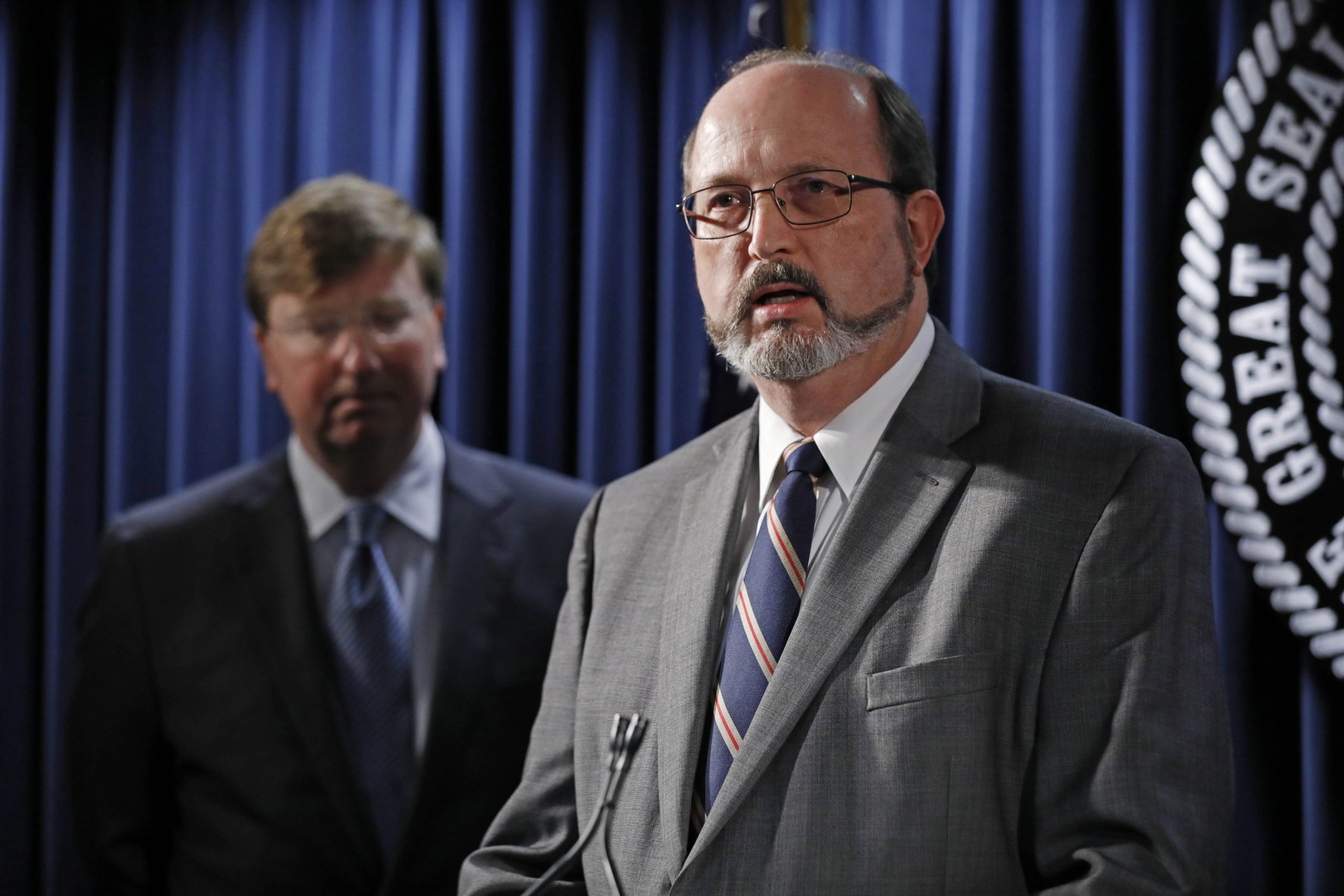Mississippi Today
State leaders still won’t fix scandalous welfare program that serves few poor families

State leaders still won’t fix scandalous welfare program that serves few poor families
Now that Mississippi’s welfare department isn’t hemorrhaging federal grant funds as a result of widespread mismanagement and political corruption, it has over $100 million to spare.
But the agency, Mississippi Department of Human Services, won’t say what it’s going to do with the money; whether it’s going to try to reach more needy families; or how it’s going to finally start tracking outcomes of the program.
In the three years following arrests in the largest public fraud scandal in state history, the agency led by Gov. Tate Reeves has never released a full accounting of its current welfare expenditures. There isn’t even a list of organizations receiving the funding on the agency’s website, nor are its subgrant agreements available online.
And lawmakers, in their seventh week of the Legislative session, haven’t taken one action to address the logjam. Instead, they’ve killed at least 11 bills aimed at improving the administration of the agency and its funds, as well as at least five amendments offered to do the same on the floors of both chambers.
All the bills filed to address these problems were killed by Republican committee chairs without debate, and all the amendments were introduced by Democrats and voted down by Republicans, primarily along party lines.
“(Mississippi Department of Human Services) has certainly not held up to its mission or its responsibility to those who need it the most,” said Rep. Omeria Scott, D-Jones, who offered an amendment to the MDHS appropriations bill on Wednesday to make increases to the agency’s budget, which Republicans reduced. “I do hate that through the general bills process that there was no legislation for a board, or no legislation for any of these audits that are in this appropriations bill, that we got any reports or any demands or anything like that. That has not been before us, and I imagine won’t be before us, but let me say to you that there are areas over there in Human Services that need some escalation.”
While Republican leadership says it has cleaned up fraud within the agency, that doesn’t mean the welfare program, called Temporary Assistance for Needy Families, is reaching the needy or helping people enter the workforce. In fact, during the height of the scandal, the state was using more of its TANF funds to help more poor Mississippians than it is today.
In 2022, a monthly average of 246 adults and 2,265 children benefited from the welfare check — no more than $260 for a family of three (a rate that was raised in 2021 for the first time since 1999). Mississippi is consistently among the most impoverished states in the nation with 1-in-5 of its residents living below the poverty line. The assistance is reaching about 4% of the more than half-a-million Mississippians living in poverty.
Meanwhile, the state continues to rack up tens of millions in welfare funds. By October of 2021, more than a year ago, Mississippi’s TANF program had amassed $97.9 million in unobligated funds. While the agency hasn’t released data showing how they spent the money within the last year, all indications are that the number of unspent TANF funds has only grown, especially since the state didn’t issue a single new TANF subgrant in 2022.
In October, MDHS Director Bob Anderson hesitated to say how his agency might spend the money, or whether it would use the funds to, for example, increase the number of child care vouchers it is able to provide to low-income families.
“Understand, people have a lot of other plans for that money as well,” Anderson said.
MDHS has refused to answer Mississippi Today’s questions about which people and what plans.
The sections of the TANF program that have received most public attention are:
- Cash assistance — the money that goes out directly to families who qualify for the welfare check
- Subgrants — the money that goes to organizations to provide TANF-related services, such as after school programs, parenting classes and workforce training
But these currently account for less than half of the state’s annual federal TANF grant.
And according to the state’s checkbook, the state spends millions of TANF funds each year on items outside of cash assistance or TANF subgrants — such as IT contracts, a contract with the company who conducts drug testing of welfare applicants, interagency transfers to the state auditor’s office or payments to the attorneys crafting the civil case against NFL legend Brett Favre and others. There has not been a public accounting of these purchases, nor have they been discussed in audits, legislative hearings or among lawmakers publicly.
Each year, the state also transfers a large chunk of TANF funds, the amount unknown to the public, to Mississippi Child Protection Services, the embattled state agency responsible for investigating child abuse and neglect and overseeing foster care across the state. The financial maneuver is preventing the state from taking advantage of unprecedented federal matching funds offered under the 2018 Family First Prevention Services Act to help families stay intact.
Aside from the scandalous stories about politicians and famous athletes funneling TANF money to their pet projects during former Gov. Phil Bryant’s administration, the welfare program itself is as forgotten and ignored as it was before the arrests.
Lawmakers passed a bill in 2021 to place law enforcement officers within MDHS’s Fraud Investigation Unit and a bill in 2022 to require that employees of the unit report civil or criminal violations to the state auditor’s office.
Neither of these changed how the agency runs its TANF grant or introduced any accountability for the agency to spend the money effectively.
In 2021, the first full year after the scandal was revealed, Mississippi spent just $35.6 million of the $86.5 million it receives in federal funds each year, according to federal reports released in December. The reports are typically outdated by about a year.
To put that into perspective: In 2018, Mississippi spent about $113 million in federal TANF funds (including some unspent funds from years before). If $50 million of that went to fraudulent or unallowed purchases, that leaves $63 million that Mississippi spent legally that year, including to organizations similar to those providing services today.
In 2018, at the height of the fraud scandal, the state pumped $7.3 million directly to families, whereas it only gave $3.5 million in cash assistance in 2021. Either way you slice it, Mississippi’s welfare department was using more TANF money to help more poor Mississippians during the years of Bryant’s appointed former MDHS Director John Davis, who is likely going to prison, than the agency is today under Reeves and Anderson.
Mississippi Department of Human Services previously told the public that it is allocating about $69 million of its TANF funds each year — $4.1 million on cash assistance, $34.5 million on subgrants to organizations and $30 million to plug budget holes at the Mississippi Department of Child Protection Services.
But it has not made documentation of these expenditures available to the public. Also, these figures are not clearly reflected in federal reports. In 2021, for example, the state only reported spending $15 million in TANF funds on “child welfare” – the only spending category that would appear to correspond with the CPS transfers.
The agency would not explain the reason for the discrepancies in the federal reporting, other than to say that it’s possible not all of the money that the state obligated was actually used. The department has also repeatedly failed to explain which purchases fall under which categories in the federal reports.
The state is allowed to use grant funds from one year to another for a period of three years. So funds being spent today could technically be coming from the state’s 2021 TANF grant. That, and the fact that some subgrants span more than one year, during which the subgrantee can draw the funds at their leisure, have perpetually created a foggy picture of the program.
The only documentation of TANF expenditures that MDHS appears to have made public, at the request of Mississippi Today, is a list of subgrantees to whom the state awards a fraction of the funds. This information does not appear on the agency’s website, nor in its annual report.
In mid-2020, the department provided to Mississippi Today a spreadsheet of TANF purchases that included, in addition to payments to subgrantees, expenditures for things like tech support or hotels for employee training. In October, Mississippi Today extracted and analyzed all purchases labeled under the TANF program from the state’s accounting database from 2015 to 2022, all of which Mississippi Today made publicly available, but the expenditures didn’t add up to nearly the amount the state reported spending to the federal government. Transfers from MDHS to CPS also do not appear on the state’s accounting database.
The department began the most recent Request for Proposals — a competitive bid process — for TANF subgrants in June of 2022. But due to staff changes within MDHS’s Division of Workforce Development and Partnership Management, a spokesperson said, the agency has not made an award.
“Once we have a finalized plan we will make a public announcement,” MDHS Chief Communication Officer Mark Jones offered in response to questions about the agency’s plan for the TANF program moving forward.
Even with the grants most recently awarded in 2021, it’s unclear what all of the organizations are accomplishing or how the programs align with a vision to reduce poverty. The current grants cover parenting initiatives ($8.1 million), after school programs ($13.7 million), and workforce development ($14.9 million). The subgrant agreements aren’t even available on Mississippi’s transparency website.
The largest award was a $6.9 million parenting initiative grant to Mississippi Children’s Home Society, or Canopy Solutions, a children’s behavioral health services provider, including a residential psychiatric facility. Canopy has been a TANF subgrantee for years and works within the foster care system to prevent family separations. Canopy also recently launched a specialized nonprofit school for students with learning differences in Ridgeland, essentially replacing the recently shuttered New Summit School by hiring its employees and recruiting its students.
New Summit closed after its founder Nancy New was charged within the welfare scandal. New was funneling TANF money to New Summit, a for-profit school, and also running a separate scam to defraud the Mississippi Department of Education, she admitted in her 2022 guilty pleas.
Other current TANF subgrantees include the Mississippi Alliance of Boys and Girls Clubs ($5.3 million), Save the Children Federation ($2.4 million), YMCA Metro Jackson ($1 million), and Juanita Sims Doty Foundation ($1 million) for afterschool programs; and Institutions of Higher Learning ($2.4 million), Mississippi Department of Employment Security ($1.5 million), South Delta Planning and Development District ($2.1 million), Southern MS Planning and Development District Gulfport ($3.6 million), Three Rivers Planning & Development District ($4.7 million) for workforce training.
Since welfare reform in the late 1990s, state leaders, workforce specialists, industry experts and advocates have met, studied, and discussed ad nauseam the barriers they’ve identified for families escaping poverty – chief among them child care, transportation and workforce training that aligns with market needs. The concept of TANF when Congress created it was to move people into the workforce, hopefully ending the reliance on government assistance.
Mississippi could be transferring up to 30% of its TANF funding to supplement the Child Care Development Block Grant, which provides child care vouchers to low-income working parents. The program has always served just a small fraction of low-income children needing child care across the state.
While legislation is not required for MDHS to make this transfer – since it has done so in the past, according to federal reports – the current Legislature has killed bills and amendments to compel MDHS to use TANF funds this way. And the agency refuses to answer questions about whether it will or, if not, why it won’t. The agency has, however, complained that without a budget supplement, 12,000 kids may be kicked off the voucher.
“From the beginning of the (TANF) program, there have been thoughts like, ‘We need to figure out a way to provide daycare. We need to figure out a way to provide transportation and that will help get a large number of people back into the workforce,’ which is said to be the aim of all these reforms,” Senate Public Health Committee Chair Hob Bryan, D-Amory, said during a floor debate on several TANF-related amendments last week. “And it is extremely frustrating that we have money that could be used for additional vouchers for childcare, so that there would be someone to care for children when their parent is at work and we’re not taking advantage of that. And yet we complain about people not working.”
This article first appeared on Mississippi Today and is republished here under a Creative Commons license.
Mississippi Today
Pharmacy benefit manager reform likely dead
Hotly contested legislation that aimed to increase the transparency and regulation of pharmacy benefit managers appeared dead in the water Tuesday after a lawmaker challenged the bill for a rule violation.
The bill was sent back to conference after Rep. John Hines, D-Greenville, raised a point of order challenging the addition of code sections to the bill, which will likely kill it.
House members in the past have chosen to turn a blind eye to the rule, which would require the added code sections to be removed when the bill is returned to conference. This fatal flaw will make it difficult to revive the legislation.
“It will almost certainly die,” said House Speaker Jason White, who authored the legislation. “And you can celebrate that with your pharmacist when you see them.”
“…This wasn’t ‘gotcha.’ Everybody in this chamber knew that code sections were added, because the attempt was to make 1123 more suitable to all the parties.”
The bill sought to protect patients and independent pharmacists, who have warned that if legislators do not pass a law this year to regulate pharmacy benefit managers, which serve as middlemen in the pharmaceutical industry, some pharmacies may be forced to close. They say that the companies’ low payments and unfair business practices have left them struggling to break even.
The bill underwent several revisions in the House and Senate before reaching its most recent form, which independent pharmacists say has watered the bill down and will not offer them adequate protection.
House Bill 1123, authored by White, originally focused on the transparency of pharmacy benefit managers. The Senate then beefed up the bill by adding provisions barring the companies from steering patients to affiliate pharmacies and prohibiting spread pricing – the practice of paying insurers more for drugs than pharmacists in order to inflate pharmacy benefit managers’ profits.
Independent pharmacists, who have flocked to the Capitol to advocate for reform this session, widely supported the Senate’s version of the bill.
The Senate incorporated several recommendations from the House into its bill, saying that they believed that the legislation would have the House’s support.
Instead, the House sent the bill to conference and requested additional changes, including new language that would eliminate self-funded insurance plans, or health plans in which employers assume the financial risk of covering employees’ health care costs themselves, from a section of the bill that prohibits pharmacy benefit managers from steering patients to specific pharmacies.
This language seeks to satisfy employers, who argue that regulating pharmacy benefit managers’ business practices will lead to higher health insurance costs.
Sen. Rita Parks, R-Corinth, who has spearheaded pharmacy benefit manager reform efforts in the Senate, previously said that adding the language to the bill would “remove any protection out of the law.” But she signed the conference report that included the language Monday after a heated conference meeting between lawmakers.
Rep. Hank Zuber, R-Ocean Springs and co-author of the bill, said the bill has something for everybody, gesturing to its concessions for employers and independent pharmacists. He said the bill gives independent pharmacists 85% of what they wanted.
Mississippi Independent Pharmacies Association director Robert Dozier was not available for comment by the time the story published.
Zuber told House members Tuesday to “blame the Senate” for the slow progress of pharmacy benefit manager reform in Mississippi, citing the body’s failure to take up a drug pricing transparency bill half a decade ago, for three years in a row.
“If the Senate had followed the leadership and the legislation that we drafted those many years ago, we would not be here,” Zuber said. “We would have the information on drug pricing, we would have the information and transparency on (pharmacy benefit managers) and we would have the ultimate reason as to why drug costs continue to rise.”
Members of the House expressed dissatisfaction with the legislation Tuesday, arguing it did not do enough to ensure lower prescription drug costs for consumers.
“I’m going to try to do something next year that goes even further,” Zuber responded.
For the past several years, lawmakers have proposed bills to regulate pharmacy benefit managers, but none have made it as far as this session.
“We’ll go another year,” said White.
This article first appeared on Mississippi Today and is republished here under a Creative Commons license.![]()
Mississippi Today
Feuding GOP lawmakers prepare to leave Jackson without a budget, let governor force them back
After months of bitter Republican political infighting, the Legislature appears likely to end its session Wednesday without passing a $7 billion budget to fund state agencies, potentially threatening a government shutdown if they don’t come back and adopt one by June 30.
After the House adjourned Tuesday night, Speaker Jason White said he had presented the Senate with a final offer to extend the session, which would give the two chambers more time to negotiate a budget. As for now, the 100 or so bills that make up the state budget are dead.
The Senate leadership was expected to meet and consider the offer Tuesday evening, White said. But numerous senators both Republican and Democrat said they would oppose such a parliamentary resolution, and Lt. Gov. Delbert Hosemann has also said it’s unlikely and that the governor will have to force lawmakers back into special session.
White said he believes, if the Senate would agree to extend the session and restart negotiations, lawmakers could pass a budget and end the 2025 session by Sunday, only a few days later than planned.
But if the Senate chooses not to pass a resolution extending the session, White said the House would end the session on Wednesday.
It would take a two-thirds vote of support in both chambers to suspend the rules and extend the session. The Senate opposition appears to be enough to prevent that.
Still, the speaker said he believes Lt. Gov. Delbert Hosemann and Senate leaders are considering the proposal. But he said if he doesn’t hear a positive response by Wednesday, the House will adjourn and wait for Gov. Tate Reeves to call a special session at a later date.
“We are open to (extending the session), but we will not stay here until Sunday waiting around to see if they might do it,” White said.
White said leaving the Capitol without a budget and punting the issue to a special session might not cool tensions between the chambers, as some lawmakers hope.
“I think when you leave here and you end up in a special session, some folks say, ‘Well everybody that’s upset will cool down by then.’ They may, or it may get worse. It may shine a different and specific light on some of the things in this budget and the differences in the House and Senate,” White said. “Whereas, I think everybody now is in the legislative mode, and we might get there.”
The Mississippi Constitution does not grant the governor much power, but if Gov. Tate Reeves calls lawmakers into a special session, he gets to set the specific legislative agenda — not lawmakers.
White said the governor could potentially use his executive authority to direct lawmakers to take up other bills, such as those related to education, before getting to the budget.
“When we leave here without a budget, it is entirely the governor’s prerogative to when he (sets a special session) and how he does that.”
While the future of the state’s budget hangs in the balance, lawmakers have spent the remaining days of their regular session trying to pass the few remaining bills that remained alive on their calendars.
House approves DEI ban, Senate could follow suit on Wednesday
The House on Tuesday passed a proposal to ban diversity, equity and inclusion programs from public schools, and both chambers approved a measure to establish a form of early voting.
The House approved a conference report compromise to ban DEI programs and a list of “divisive concepts” from K-12 schools, community colleges and universities. If the Senate follows suit, Mississippi would join a number of other Republican-controlled states and President Donald Trump, who has made rooting DEI out of the federal government one of his top priorities.
The agreement between the Republican-dominated chambers follows hours of heated debate in which Democrats, all almost of whom are Black, excoriated the legislation as a setback in the long struggle to make Mississippi a fairer place for minorities. Legislative Republicans argued the legislation will elevate merit in education and remove from school settings “divisive concepts” that exacerbate divisions among different identity groups.
The concepts that will be rooted out from curricula include the idea that gender identity can be a “subjective sense of self, disconnected from biological reality.” The move reflects another effort to align with the Trump administration, which has declared via executive order that there are only two sexes.
The House and Senate disagreed on how to enforce the act, but ultimately settled on an agreement that would empower students, faculty members and contractors to sue schools for violating the law, but only after they go through an internal campus review process that would give schools time to make changes. The legislation could also withhold state funds from schools that don’t comply.
Legislature sends ‘early voting lite’ bill to governor
The Legislature also overwhelmingly passed a proposal to establish a watered down version of early voting, though the legislation is titled “in-person excused voting,” and not early voting.
The proposal establishes 22 days of in-person voting before Election Day that requires voters to go to the circuit clerk’s office or another location county officials have designated as a secure early voting facility, such as a courtroom or a board of supervisors meeting room.
To cast an early vote, someone must present a valid form of photo ID and list one of about 15 legal excuses to vote before Election Day. The excuses, however, are broad and would, in theory, allow many people to cast early ballots.
Examples of valid excuses are voters expecting to work on Election Day, being at least 65 years old, being currently enrolled in college or potentially travelling outside of their county on Election Day.
Since most eligible voters either work, go to college or are older than 65 years of age, these excuses would apply to almost everyone.
“Even though this isn’t early voting as we saw originally, it makes this more convenient for hard working Mississippians to go by their clerks’ office and vote in person after showing an ID 22 days prior to an election,” Senate Elections Chairman Jeremy England said.
Republican Gov. Tate Reeves opposes early voting, so it’s unclear if he would sign the measure into law or veto it.
Both chambers are expected to gavel at 10 a.m. on Wednesday to debate the final items on their agenda.
This article first appeared on Mississippi Today and is republished here under a Creative Commons license.
Mississippi Today
‘A lot of us are confused’: Lacking info, some Jacksonians go to wrong polling place
Johnny Byrd knew that when his south Jackson neighborhood Carriage Hills changed wards during redistricting last year, his neighbors would have trouble finding their correct polling place on Election Day.
So he bought a poster board and inscribed it with their new voting location – Christ Tabernacle Church.
“I made a sign and placed it in front of the entrance to our neighborhood that told them exactly where to go so there would be no confusion,” said Byrd, vice president of the Association of South Jackson Neighborhoods.
Still, on April 1, a car full of voters from a senior living facility who should have gone to Christ Tabernacle were driven to their old polling place.
“I thought it was unfortunate they had to get there and find out rather than knowing in advance that their polling location was different,” said Sen. Sollie Norwood, a Democrat from Jackson who was on the ground Tuesday helping constituents with voting.
One of those elderly women became frustrated and said she no longer wanted to vote, Norwood said, though her companions tried to convince her otherwise. By midday Tuesday, 300 people had voted at Christ Tabernacle, one of the city’s largest precincts currently in terms of registered voters, but among the lowest in turnout historically.
Voting rights advocates and candidates vying for municipal office in Jackson are keeping an eye on issues facing voters at the polls, though without official results, it remains to be seen if that will dampen turnout this election with the hotly contested Democratic primary.
“I still believed it was gonna be low,” Monica McInnis, a program manager for the nonprofit OneVoice, said of turnout. “I was expecting it would be a little higher because of what is on the ballot and how many people are running in all of the wards as well as the mayor’s race.”
The situation is evolving as the day goes on, but the main issues are twofold. One, thousands of Jackson voters have new precinct locations after redistricting last year put them into a new city council ward.
Two, some voters didn’t realize their polling place for the municipal elections may differ from where they voted in last year’s national elections, which are run by the counties.
In Mississippi, voters are assigned two precincts that are often but not always the same: A municipal location for city elections and a county location for senate, gubernatorial and presidential elections
“People in Mississippi, we go to the same polling location for three years, and that fourth year, it changes,” said Jada Barnes, an organizer with the Jackson-based nonprofit MS Votes. “A lot of us are confused. When people are going to the polling place today, they’re seeing it is closed, so they’re just going back home which is making turnout go even lower.”
Barnes said she’s hearing this primarily from a few Jackson voters who called a hotline that MS Votes is manning. Lack of awareness around polling locations is a big deterrent, she said, because most people are trying to squeeze their vote in between work, school or family responsibilities.
“Maybe you’re on your lunch break, you only got 30 minutes to go vote, you learn that your polling location has changed and now you have to go back to work,” she said.
Norwood said he heard from a group of students assigned to vote at Christ Tabernacle who had attempted to vote at the wrong precinct and were told their names weren’t on the rolls. They didn’t know they had been moved from Ward 4 to Ward 6, Norwood said, meaning they expected to vote in a different council race until reaching the polls Tuesday.
Though voters have a duty to be informed of their polling location, Barnes said city and circuit clerks and local election commissioners are ultimately responsible for making sure voters know where to go on Election Day.
Angela Harris, the Jackson municipal clerk, said her office worked to inform voters by mailing out thousands of letters to Jacksonians whose precincts changed, including the roughly 6,000 whose wards changed during the 2024 redistricting.
“I am over-swamped,” she said yesterday.
Despite her efforts, at least one voter said he never got a letter. Stephen Brown learned through Facebook, not an official notice, that he was moved from Ward 1 to Ward 2.

A resident of the Briarwood Heights neighborhood in northeast Jackson, Brown’s efforts to vote Tuesday have been complicated by mixed messages and a lack of communication. He has yet to vote, even though he showed up at the polls at 7:10 this morning.
His odyssey took him to two wrong locations, where the poll managers instructed Brown to call his ward’s election commissioner, who did not answer multiple calls, Brown said. Brown finally learned through a Facebook comment that he could look up his new precinct on the Mississippi Secretary of State’s website — if he scrolled down the page past his county precinct information.
This afternoon, Brown has a series of meetings planned, so now he’s hoping for a 30-minute window to try voting one more time, even though he’s skeptical it will make a difference.
“I’m a very disenchanted voter, because I’ve been let down so much,” he said. “I vote because it’s the thing that I’m supposed to do and because of the sacrifices of my ancestors, but not because I truly believe in it, you know?”
Brown’s not alone in facing turbulence. Back at Christ Tabernacle, one Jackson voter, who declined to give her name, said she’s frustrated from having to drive to three polling locations in one day.
“I’m dissatisfied with the fact that I had to drive from one end of this street and all of the back to come over here when I usually vote over here on Highway 18,” she said. “This was a great inconvenience, gas wise and time wise.”
The same thing happened to Rodney Miller. He called the confusion some voters are facing in this election “unnecessary.”
“That ain’t the way we should be handling business,” he said. “We should be looking out for one another better than that, you know? It’s already enough getting people out to vote, and when you confuse them when they try? Come on now. That’s discouraging.”
Christ Tabernacle is the second largest precinct in the city in terms of registered voters, with 3,330 assigned to vote there as of 2024, according to documents retrieved from the municipal election committee. But it had one of the lowest voter turnout rates – 10% in the 2021 primary election before redistricting and before it became so large.
Byrd mentioned the much higher turnout in places like Ward 1 in northeast Jackson, compared to where he lives in south Jackson. Why does Byrd think this is?
“Civics,” Byrd said. “They took civics out of school. If you ask the average person what is the role and responsibility of any elected official, they can’t tell you.”
This article first appeared on Mississippi Today and is republished here under a Creative Commons license.![]()
-

 News from the South - Florida News Feed7 days ago
News from the South - Florida News Feed7 days agoFamily mourns death of 10-year-old Xavier Williams
-

 News from the South - Alabama News Feed5 days ago
News from the South - Alabama News Feed5 days agoSevere storms will impact Alabama this weekend. Damaging winds, hail, and a tornado threat are al…
-

 News from the South - Alabama News Feed4 days ago
News from the South - Alabama News Feed4 days agoUniversity of Alabama student detained by ICE moved to Louisiana
-

 News from the South - Louisiana News Feed6 days ago
News from the South - Louisiana News Feed6 days agoSeafood testers find Shreveport restaurants deceiving customers with foreign shrimp
-

 News from the South - Oklahoma News Feed3 days ago
News from the South - Oklahoma News Feed3 days agoTornado watch, severe thunderstorm warnings issued for Oklahoma
-

 News from the South - Oklahoma News Feed7 days ago
News from the South - Oklahoma News Feed7 days agoWhy are Oklahomans smelling smoke Wednesday morning?
-

 News from the South - West Virginia News Feed6 days ago
News from the South - West Virginia News Feed6 days agoRoane County Schools installing security film on windows to protect students
-

 News from the South - Florida News Feed6 days ago
News from the South - Florida News Feed6 days agoPeanut farmer wants Florida water agency to swap forest land












































